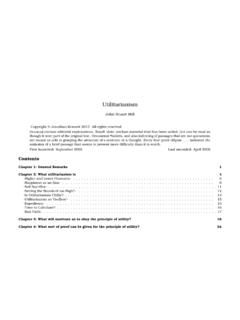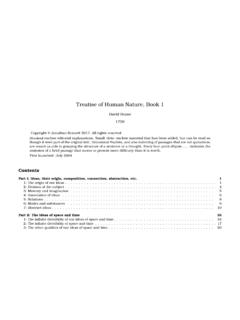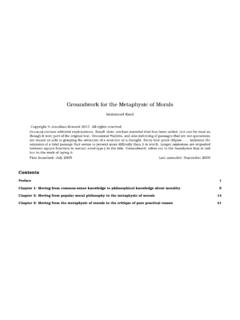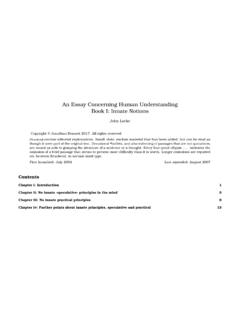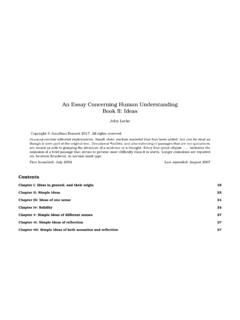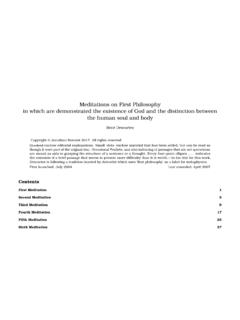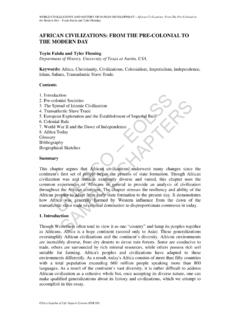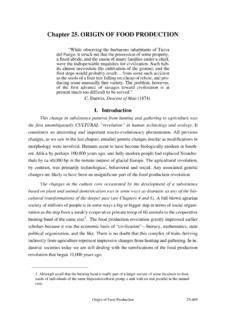Transcription of The Social Contract - Early Modern Texts
1 The Social ContractJean-Jacques RousseauCopyright Jonathan Bennett 2017. All rights reserved[Brackets]enclose editorial explanations. Small dots enclose material that has been added, but can be read asthough it were part of the original text. Occasional bullets, and also indenting of passages that are not quotations,are meant as aids to grasping the structure of a sentence or a thought. Every four-point ellipsis .. indicates theomission of a brief passage that seems to present more difficulty than it is worth. Longer omissions are reportedbetween brackets in normal-sized launched: December 2010 The Social ContractJean-Jacques RousseauContentsBOOK 111. The subject of the first book .. 12. The first societies .. 13. The right of the strongest ..24. Slavery ..35. We must always go back to a first agreement.
2 66. The Social compact ..67. The sovereign ..88. The civil state ..99. Real estate ..10 BOOK 2121. Sovereignty is inalienable ..122. Sovereignty is indivisible ..123. Can the general will be wrong? .. 144. The limits of the sovereign power .. 145. The right of life and death .. 176. The law ..187. The law-maker ..208. The people ..229. The people (continued) ..2310. The people (further continued) .. 2411. Differences among systems of legislation ..2612. Classifying laws .. 27 BOOK 3291. Government in general ..292. The source of the variety among forms of government .. 313. Classifying governments ..334. Democracy .. 345. Aristocracy ..356. Monarchy ..36 The Social ContractJean-Jacques Rousseau7. Mixed governments ..398. No one form of government suits all countries.
3 409. The signs of a good government ..4310. How government is abused. Its tendency to degenerate .. 4411. The death of the body politic ..4612. How the sovereign authority is maintained ..4613. How the sovereign authority is maintained (continued) .. 4714. How the sovereign authority is maintained (continued) ..4815. Deputies or representatives ..4916. What establishes government isn t a Contract .. 5117. Whatdoesestablish government .. 5118. How to protect the government from being taken over ..52 Book 4541. The general will is indestructible .. 542. Voting ..553. Elections .. 574. Thecomitiain ancient Rome ..585. Tribunes ..636. Dictatorship ..657. Censorship ..668. Civic religion .. 679. Conclusion ..73 The Social ContractJean-Jacques RousseauGlossaryagreement:The item that Rousseau calls aconventionisan event, whereas what we call conventions (setting asidethe irrelevant convention = professional get-together ) arenot events but enduring states of affairs like the conventionsgoverning the meanings of words, the standards of politeness,etc.
4 So convention is a wrong translation; and agreement is :To alienate something that you own is to bring itabout that you no longer own it; in brief, to give it away orsell it,arbitrary:It means brought into existence by the decisionof some person(s) . It s no part of the meaning here (as it istoday) that the decision was frivolous or :This translates Rousseau scensure. It doesn trefer to censorship as we know it today;censuredidn t havethat meaning until the 19th century. Rousseau s topic is arole that certain officials had in some periods of the Romanrepublic, namely as guardians of, and spokesmen for, thepeople sm urs(see below). They could be thought of as aninstitutionalising of the court of public opinion . On page 67we see him stretching the original , Contract :These translate Rousseau spacteandcontratrespectively.
5 He seems to mean them as :In this work a thing s constitution is thesum of facts about how something isconstituted, how itsparts hang together and work together (so the constitutionof a state is nothing like a document). Items creditedwith constitutions are organisms and political entities; themention on page 66 of the constitution ofa :In this work, as in general in Early moderntimes, a magistrate is anyone with an official role in govern-ment. The magistracy is the set of all such officials, thoughtof as a single urs:Them ursof a people include their morality, theirbasic customs, their attitudes and expectations about howpeople will behave, their ideas about what is decent.. and soon. This word rhyming approximately with worse is leftuntranslated because there s no good English equivalent toit.
6 English speakers sometimes use it, for the sort of reasonthey have for sometimes person:Something that isn t literally person but isbeing regarded as one for some theoretical purpose. See forexample pages 9 and :Rousseau repeatedly speaks of a people in thesingular, and we can do that in English ( The English what astrange people! ); but it many cases this way of using people sounds strained and peculiar, and this version takes refugein populace . On page 4, for instance, that saves us from Inevery generation the people was the master..prince:As was common in his day, Rousseau uses prince to stand for the chief of the government. This needn t be aperson with the rank of Prince; it needn t be a person at all,because it could be a :This translatessouverain. As Rousseau makesclear on page 7, he uses this term as a label for the personor group of persons holding supreme power in a state.
7 Ina democracy, the whole people constitute a sovereign, andindividual citizens are members of the sovereign. In Books 3 The Social ContractJean-Jacques Rousseauand 4 sovereign is used for the legislator (or legislature) asdistinct from the government = the :What is needed for survival a minimum offood, drink, shelter :An inevitable translation ofsage, but the meaning inFrench carries ideas of learned , scholarly , intellectuallyable , rather more strongly than whatever it is that you and Imean by wise .you, we:When this version has Rousseau speaking of what you or we may do, he has spoken of what one may do. Itis normal idiomatic French to useon= one much oftenerthan we can use one in English without sounding stilted(Fats Waller: One never knows, do one? ).The Social ContractJean-Jacques Rousseau12.
8 The first societiesBOOK 1 This little treatise is salvaged from a much longer work that I abandoned long ago, having started it without thinking aboutwhether I was capable of pulling it off. Of various bits that might be rescued from what I had written of that longer work, what Ioffer here is the most substantial and, it seems to me, the least unworthy of being published. None of the rest of it plan to address this question: With men as they are andwith laws as they could be, can there be in the civil orderany sure and legitimate rule of administration? In tacklingthis I shall try always to unite whatrightallows with whatinterestdemands, so that justice and utility don t at anystage part start on this without showing that the subject is impor-tant. You may want to challenge me: So you want to write onpolitics are you then a prince[see Glossary]or a legislator?
9 Ianswer that I am neither, and that is why I write on I were a prince or a legislator I wouldn t waste my timesayingwhat should be done; I woulddoit, or keep I was born a citizen of a free state, and am a memberof its sovereign[see Glossary], my right to vote makes it myduty to study public affairs, however little influence my voicecan have on them. Happily, when I think about governmentsI always find that my inquiries give me new reasons for lovingthe government of my own country!1. The subject of the first bookMan is born free, and everywhere he is in chains. Here sone who thinks he is the master of others, yet he is moreenslaved than they are. How did this change come about? Idon t know. What can make it legitimate? That s a questionthat I think I can I took into account nothing but force and what can bedone by force, I would say: As long as a people is constrained to obey, it doeswell to obey; as soon as it can shake off the yoke, itdoes even better to shake it off.
10 If its right to do so ischallenged, it can answer that : it gets its liberty backby the same right namely, force that took it awayin the first place. Any justification for taking it awayequally justifies taking it back; and if there was nojustification for its being taken away no justificationfor taking it back is called for . But the Social order isn t to be understood in terms of force;it is a sacred right on which all other rights are based. But itdoesn t come from nature, so it must be based on coming to that, though, I have to establish the truthof what I have been The first societiesThe most ancient of all societies , and the onlynaturalone,is the society of the family. Yet the children remain attachedto the father only for as long as they need him for theirpreservation; as soon as this need ceases, the natural bondis dissolved.


